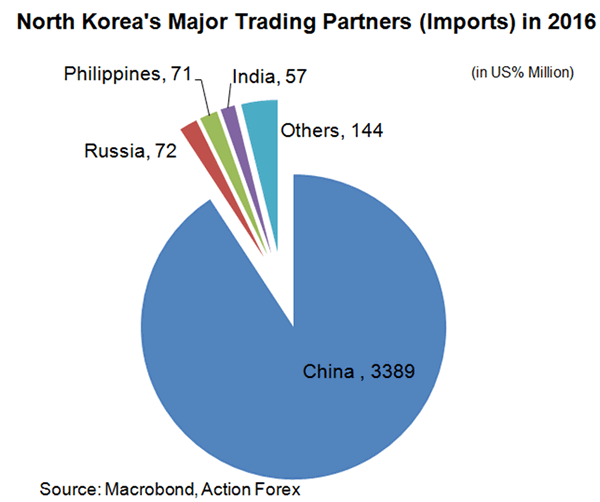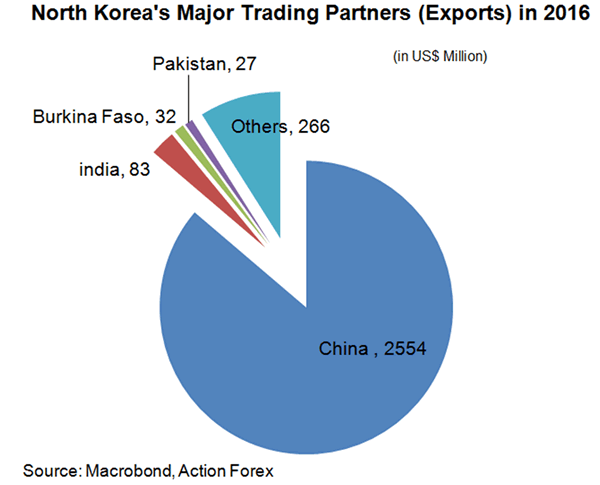Korean peninsula tensions have escalated further as North Korea confirmed the sixth nuclear test on Sunday, following a missile launch over Japan on August 29. In response to the growing threat of its closest neighbor (and ethnic brother), South Korea has earlier today conducted a missile drill and pledged to implement contingency measures to stabilize the economy in case of drastic deterioration. In the US, Defense Secretary James Mattis warned of "massive military response" to North Korea’s intimidation, echoing President Donald Trump’s comment ‘all options are on the table’ following the rogue regime missile launch last week. While US’ warnings imply that a military strike against North Korea cannot be ruled out, we believe the chance is low as it is the least preferred option for all major stakeholders.
North and South Korea
As one of the world’s poorest countries without the ability to be self-sufficient, North Korea has been adopting brinkmanship diplomacy over the past 28 years (suspected to have begun nuclear developments in 1989) to sustain its international position and acquire international aids on food and money. Guardian (https://www.theguardian.com/world/2015/may/29/north-korea-nuclear-brinkmanship) has made a good summary of its routine:
Step 1: North Korea wants or needs something, most often food or petroleum.
Step 2: North Korea generates tension and gains international attention.
Step 3: Countries initially ignore the activity and attribute it to North Korea merely ‘acting up’.
Step 4: North Korea increases tension through increasingly violent acts or extreme rhetoric.
Step 5: The world finally pays attention and agrees to discuss a resolution.
Step 6: North Korea agrees to stop its nuclear and missile programs in exchange for what it needs or wants: food, petroleum or other aid.
Step 7: Once the aid is received, North Korea soon finds – or invents – a way to justify breaking its commitment.
Step 8: Repeat
Therefore, the ultimate intention of North Korea’s nuclear development is not to engage in military conflicts but to survive. South Korea is not ready for war either, casualty and economic crisis to be brought by war would be massive
China:
As the biggest trading partner of North Korea, it is estimated that 90% of North Korea’s imports
(mainly machinery, food, oil and refined petroleum products) are from China. China and Russia are allegedly supporting the rogue regime’s nuclear developments. China is also the biggest destination of North Korea’s exports. China has been reluctant to impose sanctions on North Korea and is believed to continue trading with its neighbor under secret channels despite the sanctions.
Besides being ideological comrades, China’s support of North Korea has more important strategic reasons – both on facilitating its rise as the leader in Asia Pacific and counterbalancing the US in the world arena. Trump’s pressure on China to act more on the denuclearization of North Korea has evidenced China’s major role in North Korea’s problem. As a bargaining chip for China in international relations, it is believed that China supports North Korea’s nuclear development as long as it does not evolve into military conflict. The consequence of a war is highly uncertain. Basing on the assumption that North Korea would be defected by the military of the US and its allies, refugee problem would be a headache to China, given its close proximity to North Korea. The impacts on Asia Pacific international relations can be huge. Some believe that an enlarged South Korea (after conquering the North) would make the US alliance in the region more powerful, while other believe the US’ influence in the region would reduce as a major threat is eliminated. Only time will tell which view is correct but China, as well as the US, won’t want to risk.


US
The stances of the US and President Trump can be different. Traditionally, the US has been adopting ‘strategic patience’, while insisting denuclearization of North Korean, on the Korean peninsula issue. The then-president Barack Obama’s announcement of a ‘pivot to Asia’ in 2011, followed by proposal of the Trans-Pacific Partnership, was aimed at reassuring its Asian allies of the US’ commitment to the region. However, Trump’s swift withdrawal from TPP as soon as he has been in office, together with his close relations with Russia, has made his stance on North Korea’s problem more ambivalent. While Trump has been keen on exchanging war of words with Kim jong-un, he is not ready for a real military strike when he is not yet capable of handling domestic politics well.
While we believe the chance of actual military strike is remote, ongoing missile tests by North Korea would cause financial market volatility. Therefore, safe-haven assets such as Japanese yen, Swiss franc and gold would be attractive during times of intensified tensions.
